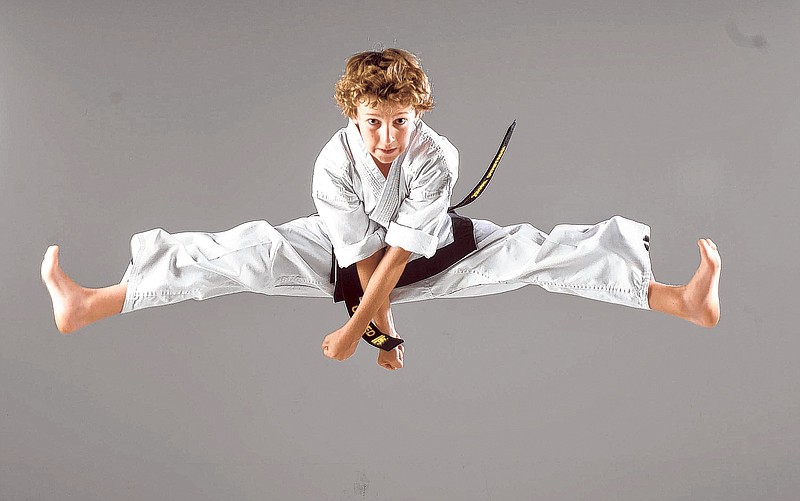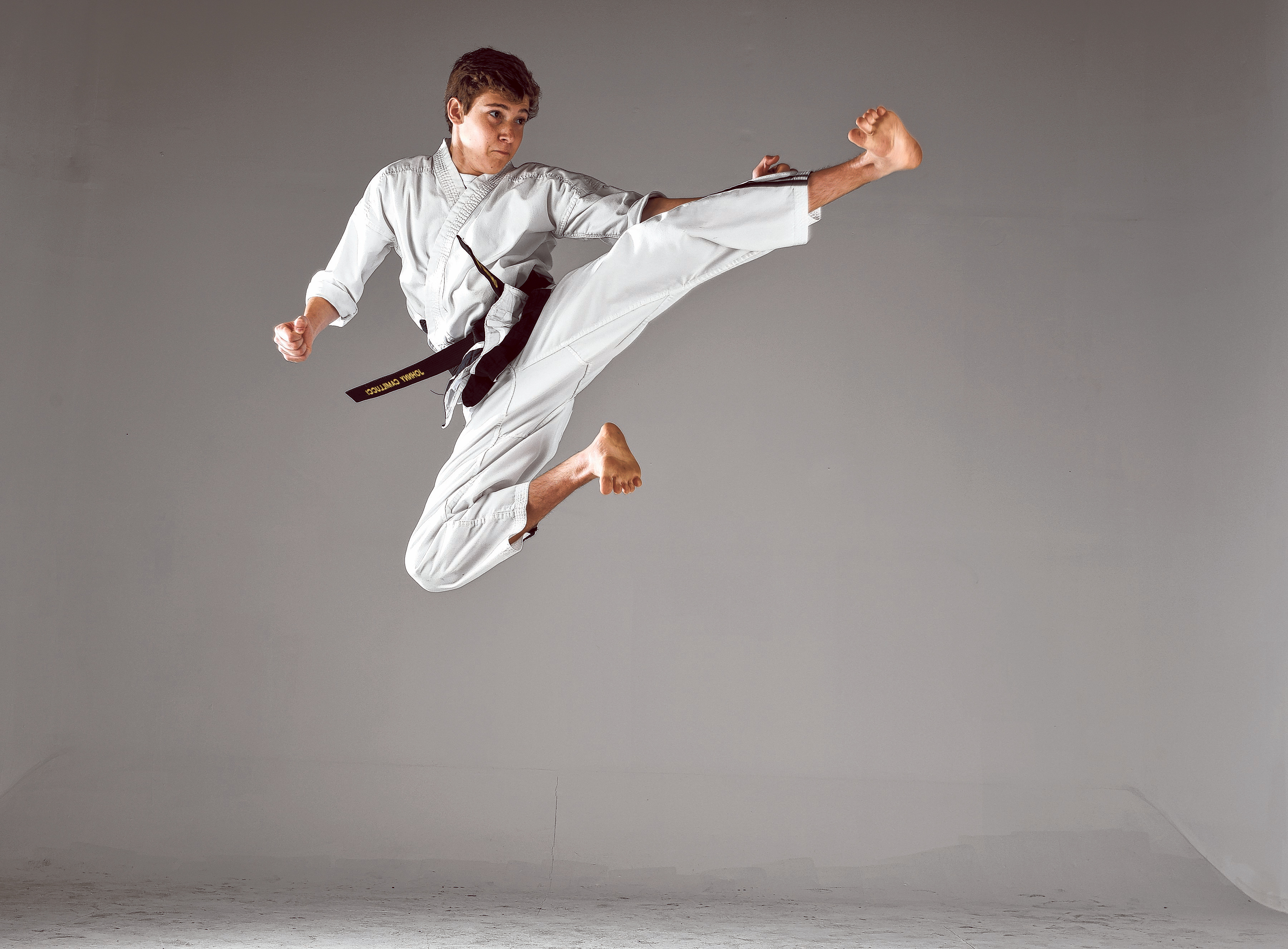Black belt
"The tree has reached maturity and has overcome the darkness ... it must now 'plant seeds for the future.' The color black is created when all the colors of the light spectrum have been absorbed into an object. That object has 'taken control' of the colors and retained them. If one color was to 'escape,' the object would no longer be black but would appear as that color. The student has mastered the nine geup (grades) of Taekwondo. He/she has 'absorbed' all the knowledge of the color ranks and overcome or 'mastered' that level or training. The colors of the spectrum are bound together and are not reflected off an object, resulting in the absence of color which we call black." Source: American Taekwondo Association
Leading in points and with three seconds to go, Johnny Camillucci threw a left punch.
He was off balance; his opponent in the Taekwondo tournament was leaning in. As soon as Johnny's fist connected, the 14-year-old -- then a second-degree black belt in the Korean martial art -- knew something had gone painfully awry.
"It was like stubbing your toe, but instead of it hurting really bad and then easing up, it didn't stop," the Ringgold, Ga., teen recalls. "I took off my glove, and my arm was bent funny."
It was the first bone Johnny ever broke, and his arm was immobilized for two months. During that time, he couldn't run, much less train. But in January, just one day after his doctor said he could stop wearing his brace, Johnny went to Dalton, Ga., to take the rigorous test to become a third-degree black belt.
He passed.
United Karate Studios is a 15-studio system of dojos spread mostly across Georgia and Tennessee, but there's also one in Iowa. In the 45 years since it was founded, Johnny is the only student in the school to earn a third-degree black belt before age 16. Typically, students don't reach their third-degree belt until at least 21, but his instructor, Jessie Thornton, says Johnny stood out from the crowd the moment he walked into his studio at age 6.
"I was blown away with his intelligence and his comprehension of what we were teaching him," says Thornton, a seventh-degree black belt and an instructor for more than 30 years. "You find some young children that age who are real smart, but to do something that's as physical as what we do and be able to maintain it -- it was amazing."
A tall and lanky eighth-grader, Johnny doesn't walk around wearing the belt for which he worked so hard, but even without it cinched in a complicated knot at his waist, he exudes an air of calm self-assuredness. He doesn't smile much, and his voice doesn't often betray much emotion.
His father, John Camillucci, says he was born old, and martial arts has just added to that sense of unlikely maturity.
"You look at him, and it's like looking at an older person in a younger person's body," he says.
Attaining a third-degree black belt at such a young age is just the latest in a series of precedents Johnny has set since he began studying martial arts 11 years ago.
At age 7, he became the youngest student at United Karate to undertake the rigorous black belt exam. The test, which lasts more than six hours, is a measure of both stamina and ability, requiring students to demonstrate mastery of hundreds of techniques. Some examinees get so worn out that they can't complete it; others sweat through their uniforms and need to change.
Normally, students aren't allowed to take the exam until age 10 at the earliest, Thornton says. Even then, all windows into the testing area are covered, and students are forbidden from discussing the details of the experience with anyone who hasn't undertaken it themselves.
Allowing a first-grader like Johnny to try for a black belt wasn't an automatic, Thornton says.
"We talked about it and talked about it and discussed it," he says. "Many people probably wouldn't take the test if they knew what you have to go through. Even his parents don't know what he went through."
Johnny still takes his oath of silence seriously.
"I'm not allowed to talk about it," he says, stone-faced.
Even after witnessing the dedication his son demonstrated during the months of intense training leading up to that first exam the elder Camillucci recalls waiting outside that blacked-out room with frayed nerves.
"You're sitting out. You're worried, 'Is he going to do it?'" he says. "A lot of karate places will just give you the belt and not have you earn it. This studio makes you earn it."
For many Taekwondo students, attaining a black belt is an end point to their studies, but United Karate teaches that, rather than an indication of mastery, a black belt is just the beginning of the next stage in a martial artist's training.
For Johnny, continuing to study was never a question. Three years after earning first-degree, he set another United Karate record by becoming the youngest student to attain a second-degree black belt. Earning that rank requires students to demonstrate the 18 forms they mastered for the first black belt exam as well as four new ones.
Even though the exam lasted a fraction as long as the test for his original black belt, it was no cakewalk, Johnny says.
"It was those six to eight hours crammed into one hour," he says. "It didn't stop, not even for a second."
As soon as he earned his second-degree belt, however, he immediately began preparing himself for the next level.
Typically before rising to the next black-belt rank, Taekwondo students must train for the number of years equivalent to the degree of belt they're hoping to attain. Had he not been sidelined by that flubbed punch, Johnny would have been right on target months ago to take the third-degree test, which tacks one additional form onto the 22 forms students execute during the second-degree test.
Johnny says his sights now are set -- naturally -- on a fourth-degree belt, which would place him in the rank of Taekwondo master within the United Karate system. Thornton says he has little doubt Johnny will earn that rank, which conceivably could be at age 18, about seven years earlier then the next youngest master-level practitioner.
"As far as the age he'd need to be ... it hasn't been discussed, but it's going to have to be," Thornton says, laughing. "I do see him attaining that. That's my belief and my prayer."
Contact Casey Phillips at cphillips@timesfreepress.com or 423-757-6205. Follow him on Twitter at @PhillipsCTFP.

